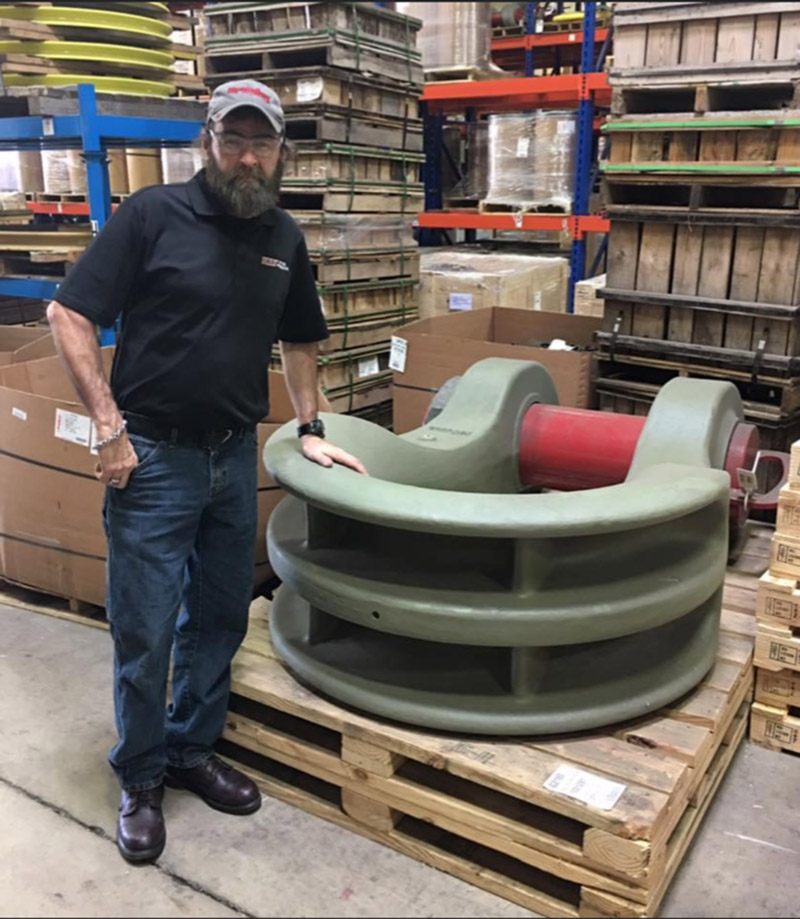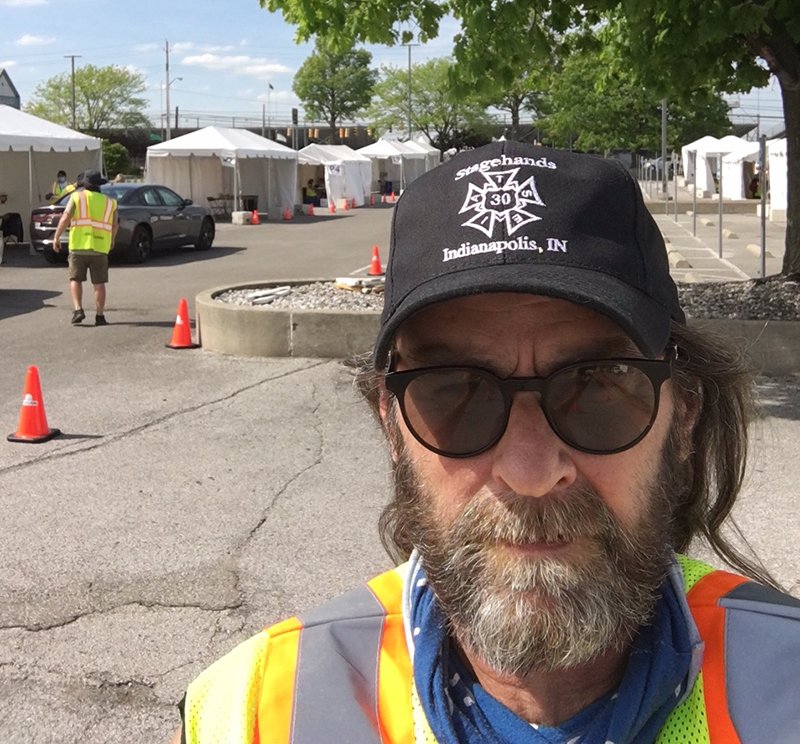
Albert West is a Swiss Army Knife of roadies: While a lot of his work through the years involved rigging, he has also been a production manager, tour manager, operations manager, stage manager, hydraulic carpenter, guitar tech, drum tech … and probably did some other things even he doesn’t remember. Oh, he remembers another: “I’ve even tuned an autoharp.”
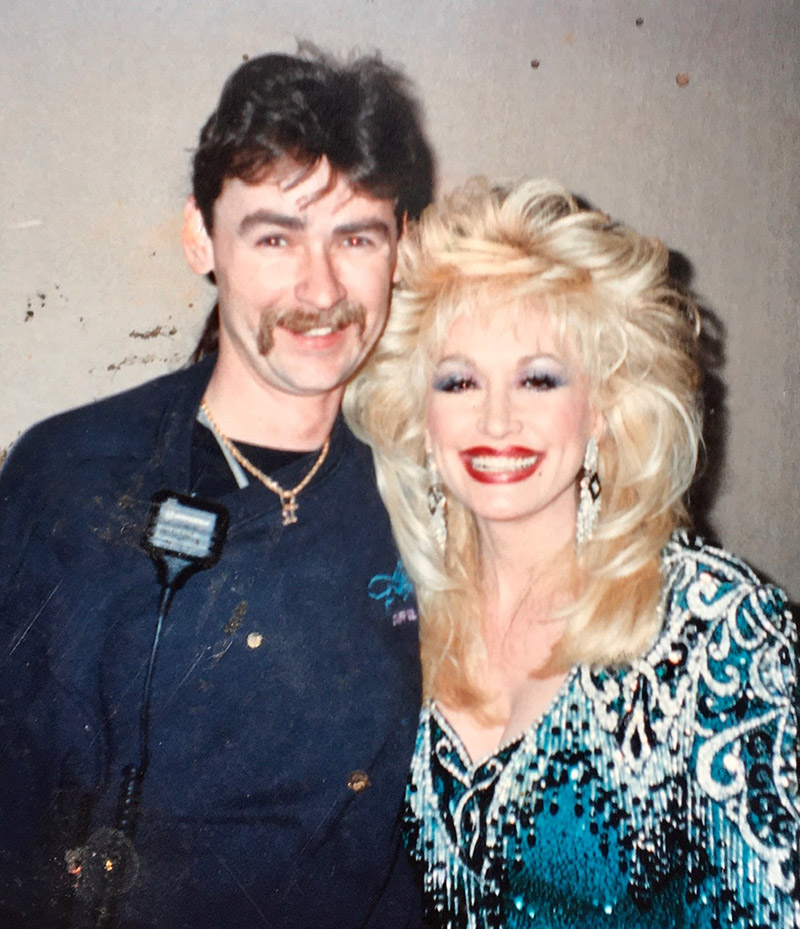
Just a few of the artists he’s toured with include The Judds/Wynonna Judd, Dolly Parton, Harry Connick Jr., Reba McEntire, and Paul Rodgers/Bad Company. He’s worked plenty of sporting events and special events (included some presided by POTUS). Just a few months ago, he worked a mass vaccination site in Indianapolis where over 20,000 shots were given — just another an example of a true professional who takes almost any call.
West has seen it all — and not all of it was good. He had often worked the shows at the Indiana State Fair and was peripherally involved in 2011 when the stage collapsed, killing seven and injuring 58. Spotlight operator Nate Byrd was one who was killed. The year before, West was operating one of those spots, and while he was working at the site Tuesday and Wednesday, he was on tour with Wynonna that Saturday. As soon as he got wind of the bad news, “I was calling everybody I knew on the site and no one was answering the phone. That’s when I knew it was brutal.”
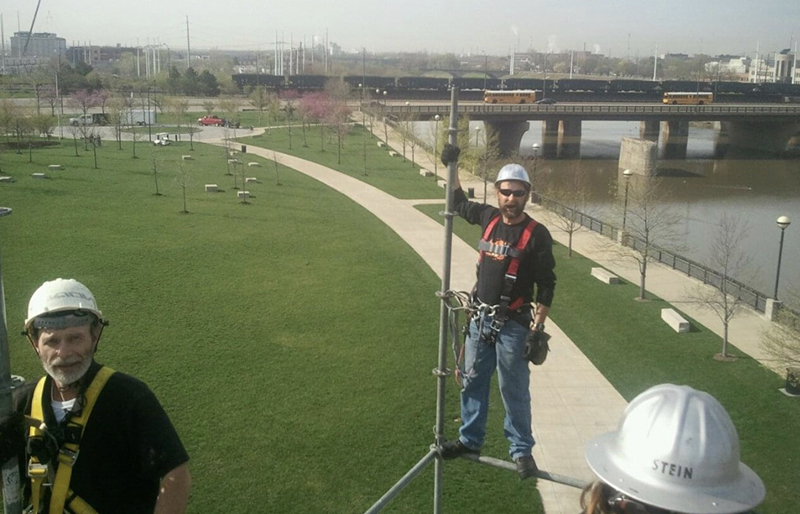
It was. “Nate ‘Save the Show’ Byrd was our IATSE Local 30 union brother, and Nate’s son Trevor and my son AJ West are now legacies in our Local,” he says. Another union brother, Steve Stover, was found under the fallen main structure. “When I walked into his hospital room, the face I saw was so bad I thought it couldn’t be Steve. But it was.” West pauses and adds: “Nobody likes to talk about this event. And for me, there are too many ‘what if’s.’”
The following year he was out with Wynonna. On an August day in Deadwood, SD, he was setting up Wynonna’s drummer/husband Cactus Moser’s kit. Moser would not make the gig, felled in a terrible motorcycle accident early that afternoon. It would cost him his left leg. The crew packed up and heading home, wondering if Moser was even going to make it through. “That was a horrible day, though it’s amazing he not only survived but returned to playing drums.”

Something in the Water?
West wonders aloud if there is something in the water in Indianapolis’ Broad Ripple Village neighborhood. The hip district has long been described as having a “free-spirited vibe” with “happening clubs,” and likely related, it is where a lot of future live event professionals grew up. “There are probably a dozen people out working in this business from that little neighborhood,” he says. This list includes John Cooper (FOH engineer for Bruce Springsteen); Alan Jackson monitor engineer Scott Holloway and guitar tech Rocky Harrison; Chris Stapleton production manager John Garriott; and even this magazine’s publisher and one-time local drummer and music promoter, Terry Lowe. “Terry was booking bands in Broad Ripple back when he still lived there — which was a while ago, and that’s why we both have gray hair,” West says. Add to the list singer/songwriter John Hiatt and former talk show host David Letterman.
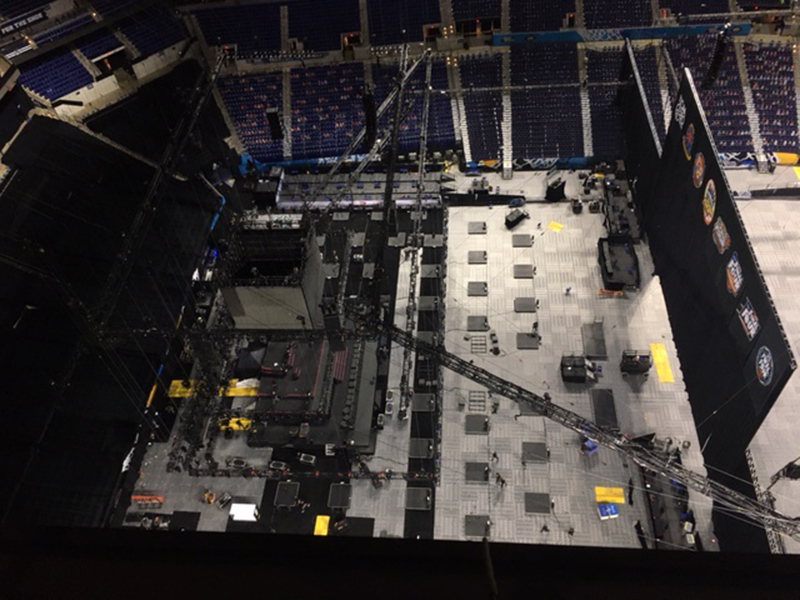
West was into photography in high school, and that was his pass to get into local rock shows. He then connected with a local top 40 band and did some roadie work for them. By 1984, he was doing some work with Indianapolis’ premier venue, The Vogue, where regional and national acts would play. “I remember early on unloading for Frank Zappa where I saw 70 percent of his gear ended up sitting in the parking lot because it wouldn’t fit into the club,” he says. “They did two shows and it was an amazing moment for me. I still have the backstage passes from those days.”
In the late 1980s, some friends of his were touring with the Judds and got him some fill-in dates. “It was a great learning experience,” he says of what became his Rigging 101 class. “I would fill in for two or three weekends here and there.” He says the first thing newbies do is ground rigging and learning how things are put together logistically. “Then, under supervision, we were allowed to hang a point safely. It’s a lot different now — there’s a lot more training.” He got some additional dates during the mother-daughter act’s 1991 Farewell Tour.
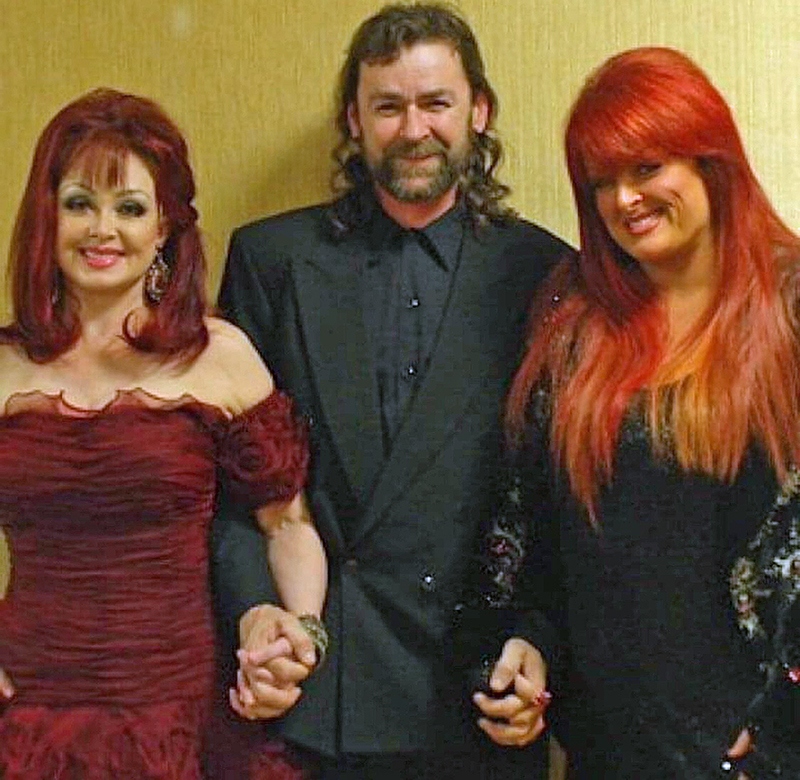
Wynonna and Beyond
When Mama Judd retired, West went out as a carpenter for Wynonna’s many tours as she skyrocketed to fame. “That was another great experience because The Judds, then Wynonna, had a crew that worked well together,” West says. “Even after all these years, most of us are still good friends. From there he landed a three-year stint with Dolly Parton. “Your work ethic does a lot of the talking for you; that and being good at what you do.” He is quick to confirm Parton’s reputation for kindness and respect. “When I got to introduce Dolly to my mom, they talked for 30 minutes like they were long lost sisters. The way Dolly treats people is just unbelievable.”
At this point, West was wearing more than one hat, handling rigging duties in addition to production and stage manager ones. His reputation continued to grow, and his next call came from Reba McEntire’s team for her 1994 Read My Mind tour. It was a big step up as this tour went out for a full year and required 16 trucks and eight buses (the tour ended up on the cover of Pollstar magazine). “For that I was a hydraulic carpenter,” he says. It was needed for a special video wall from Tait that had a flex glass cover over it. Training him for this was with another legend in the live event industry, Tait’s Robert “Hydro Bob” Mullens. “That tour was one well-oiled machine.”
Next was work with country music singer John Michael Montgomery. West would do three years as a production and stage manager for him. Then, for something completely different, he went out with actor/musician Harry Connick, Jr. “I was lucky enough to be hired as stage manager by Ted Jonas Productions,” an Indianapolis-based touring company. “That was a whole different music — it was groovy, and we all always enjoyed how [Connick] would always cut lose and play to the crowd.”

Calling the Local Union Home
Next West got to plant his feet in his hometown when he became technical director/promoter rep for Sunshine Promotions, which was in charge of the Murat Shrine Temple (today known as Old National Centre). Built in 1909, the 2,500-seat venue completely shut down before reopening in 1996 with a full rehab, with West overseeing all things technical. The timing was good: “I had kids in school, and it was nice to be home,” West says. Once up and running, he oversaw everything that came through from the original touring Phantom of the Opera, to live music, special events, and visual arts. But the big theater was just one component of a complex that often had multiple acts happening at the same time. More than once he had the headache of muffling events happening with baffles, so, you know … a loud rock band wouldn’t bleed into the space where a ballet troupe was performing. It was perhaps too much of a good thing, as the 100-hour weeks burned him out. After seven years, it was time for another change.
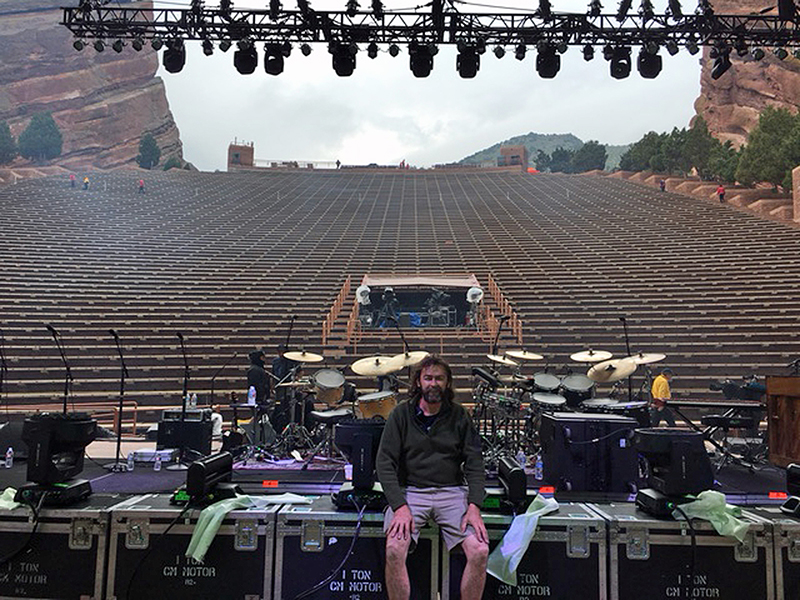
West hit the road once more as PM for the bands associated with Paul Rodgers including Bad Company and Free, both in the USA and U.K. Then, for the last 10 years, he’s mainly stayed in Indianapolis taking rigging calls and working for Tway Lifting Rigging Inspections (with them he worked a way-cool Indy car NYE drop in downtown in 2017 and 2018).
Reflecting on rigging, he says, “Every day is a little different, and you are always adjusting from what you were told was going to happen [on a site] to what ends up being in front of your eyes. The good riggers make their money figuring it out and staying safe. I’ve seen some go in and panic, which is bad, because the whole crew reacts to how the rigger reacts.”
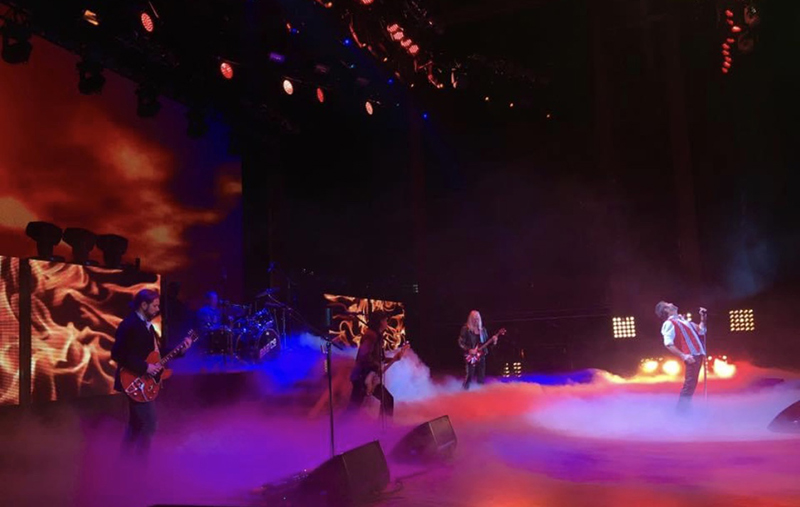
You don’t have a career like this without gaining some basic survival skills. “I learned early on that it’s almost always best to treat a star like a normal person — they need that more than anything else, and really appreciate it,” West says, before pausing; then he adds, with a laugh, “Most — not all.” The key to rigging is “more than anything, respect what you’re doing. Respect the height you’re working at. Know the limits, and if you ever feel unsafe, don’t do it. Have a rescue plan in place before you need it. Even when you’re walking a catwalk fully harnessed, just understand it is extremely dangerous. Respect….” While getting into rigging today is quite different than when he first did, he says for those that want to get into it should start by finding someone who will teach you. “Ask a lot of questions. Show your work ethic. Be strong…and don’t be afraid of heights.”
